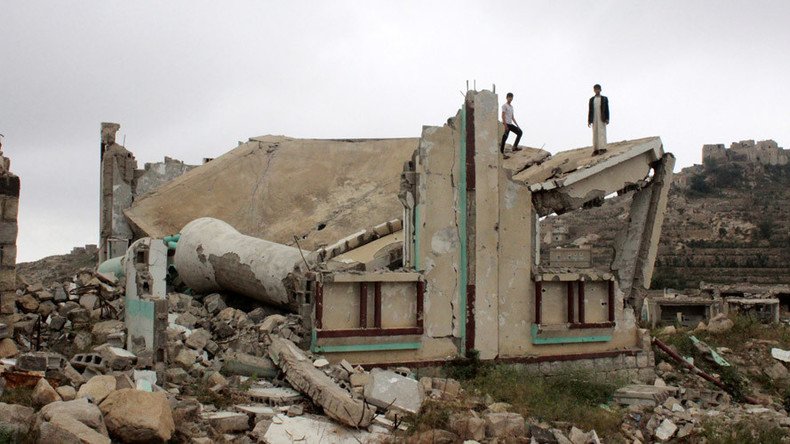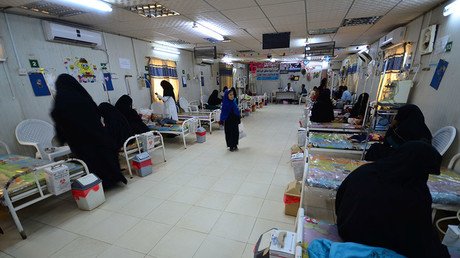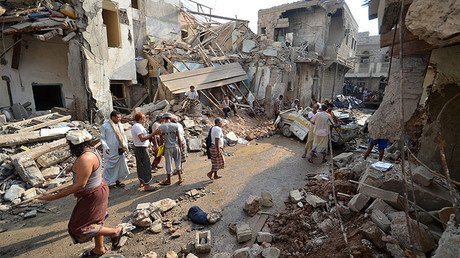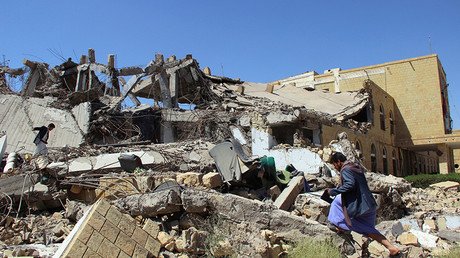'Threshold not crossed’: Boris Johnson denies Saudi bombing massacres in Yemen breach int'l law

The UK government does not believe that Saudi Arabia’s bombing campaign in Yemen violates international law, Foreign Secretary Boris Johnson said, defending the UK’s arms sales to Riyadh and expressing support for the Arab kingdom.
“So far, we do not believe that there has been a clear risk of a breach of the international humanitarian law,” Johnson told BBC One’s Andrew Marr Show, referring to the Saudi actions in Yemen and adding: “At the moment, we do not think the threshold has been crossed.”
The foreign secretary then reaffirmed the British allegiance to the Arab kingdom by saying that the UK is “supportive” of Saudi Arabia and has a “longstanding partnership” with it, as he defended the British government’s policy of selling weapons to the Arab country.
He went on to say that the actions of Saudi Arabia are justified and even supported by the UN. “There is a campaign supported by the Arab League, by a vast coalition, supported by the UN to move Houthis out of Sanaa and restore the legitimate government,” Johnson said, referring to the Yemeni Houthi rebels who forced President Abdrabbuh Mansour Hadi to go into exile and seized large swathes of Yemeni territory, including the Yemen’s capital of Sanaa in 2014 after Shia President Ali Abdullah Saleh was deposed in 2012.
However, the UN has blamed the Saudi Arabia-led coalition’s airstrikes for the majority of civilian deaths in the Yemeni conflict, and called for an international investigation in August, citing allegations of breaches of international humanitarian law and international human rights law in Yemen.
A report released by the Yemen Data Project in September concluded that one-third of Saudi airstrikes hit hospitals, schools, and other civilian targets across the country.
Saudi Foreign Minister Adel al-Jubeir told the Guardian at that time that those figures were “vastly exaggerated,” and blamed Houthi fighters for turning civilian buildings into “command control centers” and “weapons depots.”
On Sunday, Johnson also put the blame solely on the Houthis by saying that they had “evicted the government and are attacking Saudi Arabia.”
At the same time, he denied that the UK is directly involved in the Saudi airstrikes in Yemen, arguing “we are not engaged in the command and control systems of the [Saudi] operations.”
“We tried to give general advice to the Saudis about how to do these things [but] we are not in the targeting,” he told BBC journalist Andrew Marr, adding that the British advisors only “give [general] guidance about how targeting should work.”
The Saudi led-coalition fighting in Yemen has been accused of numerous airstrikes against civilian targets that have resulted in heavy casualties. On November 23, 12 civilians were killed by a Saudi-led airstrike while riding in a pick-up truck in northwest Yemen.
Two months earlier, 135 civilians were killed by a reported. Saudi-led airstrike at a wedding in the southwestern village of Al-Wahijah, although the Saudi-led coalition denied responsibility for the attack.
In late October, at least 60 people, including prison inmates, were killed in another Saudi-led coalition airstrike on a prison in the Houthi-controlled port city of Hodeidah. Earlier the same month, the Saudis bombed a funeral attended by over 1,000 mourners, killing at least 110 people and wounding 610 others.
Human Rights Watch accused the Saudi-led coalition of war crimes following the early October incident.
“Serious violations of the laws of war committed willfully – that is, intentionally or recklessly – are war crimes. The date and place of the funeral ceremony… would have been publicly available,” HRW said at that time.
Since the beginning of the Saudi-led air campaign in Yemen on March 26, 2015, the Saudi coalition, with direct military support from the US and assistance from the UK, according to HRW’s record, conducted at least 58 “unlawful airstrikes.”
At least 4,125 civilians were killed and 7,207 wounded in Yemen between March 2015 and October 2016, according to UN OHCHR, with the majority of casualties coming from coalition airstrikes.
Despite Saudi Arabia being repeatedly accused of grave human rights violations and even war crimes, the UK government has insisted that its arms sales to the Arab kingdom do not breach international law. On November 15, the British government refused to stop arms sales to Saudi Arabia, rejecting calls by two parliamentary committees.
The Gulf is a “crucial market for defense exports, in particular Saudi Arabia, to which over 30 percent of all UK arms export licenses in 2015 were approved,” the Foreign Office said at that time, citing the UK government’s “robust licensing regime as evidence that its arms export practices are responsible.”
In October, Boris Johnson also said that if Britain did not sell arms to Saudi Arabia, other countries “would happily” take over the market. According to the Independent daily, the UK has sold arms to 22 of the 30 countries on its own human rights watch list since 2010.















